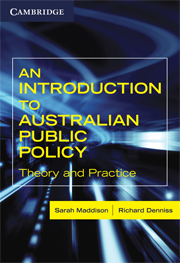Book contents
- Frontmatter
- Contents
- List of figures
- List of tables
- List of case studies exercises, and original contributions
- Foreword
- PART 1 Policy and theory
- PART 2 Policy in practice
- 7 Who does policy?
- 8 The nuts and bolts of policy work: advice, implementation and evaluation
- 9 The role of the media in setting the policy agenda
- 10 Consulting with stakeholders
- 11 Research and policy
- 12 Communication, ethics and accountability
- References
- Index
- References
10 - Consulting with stakeholders
- Frontmatter
- Contents
- List of figures
- List of tables
- List of case studies exercises, and original contributions
- Foreword
- PART 1 Policy and theory
- PART 2 Policy in practice
- 7 Who does policy?
- 8 The nuts and bolts of policy work: advice, implementation and evaluation
- 9 The role of the media in setting the policy agenda
- 10 Consulting with stakeholders
- 11 Research and policy
- 12 Communication, ethics and accountability
- References
- Index
- References
Summary
The primary focus in this book has been on the knowledge and skills needed by those we have termed ‘policy workers’. In this chapter we extend the discussion beyond those who make policy to those we might think of as participating in the policy process.
As with so many other aspects of the policy process that we have discussed thus far, determining who can and who cannot participate in the policy process is not politically neutral. As Colebatch notes, not everyone with an interest in a policy issue will be granted a seat at the table, and even if they are, they will find that not all seats are the same (Colebatch 2002: 36). Recent years have seen this issue gain significant scholarly and political attention, particularly in light of claims that the Howard Government, influenced by public choice theory, made it increasingly difficult for voices critical of that government's policies to be heard in policy debate (see Maddison and Denniss 2005, Maddison and Hamilton 2007). One reason this issue has been so hotly debated is because of the implications for democracy and democratic policy making. Indeed, as Verspaandonk has suggested, it is a legitimate expectation that a well-functioning democracy will ‘grant citizens the right to be consulted between elections about the work of government’ (Verspaandonk 2001: 9).
In the policy cycle described (and critiqued) in Chapter 4, the role of consultation is considered to be a discrete stage of policy development.
- Type
- Chapter
- Information
- An Introduction to Australian Public PolicyTheory and Practice, pp. 198 - 216Publisher: Cambridge University PressPrint publication year: 2009



